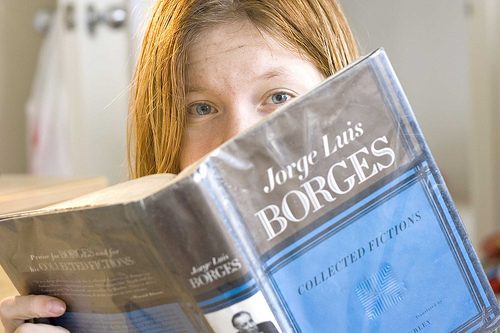Now Go Read: Beyond Borges

A writer worth reading for a lifetime, Borges still shouldn’t be your only stop on the Latin American reading circuit.
Sometimes when Latin American literature comes up as one of my areas of research in a casual setting, I hear things like, “Oh, so you read Borges, right?”
Don’t get me wrong: Borges is great–and important. So of course I read Borges. In fact, I studied in the very building at UT-Austin where he once gave lectures as a guest.)
But there are important literary horizons beyond Borges in Latin America, even in Argentina itself. If I had it my way, I’d beam any eager readers straight into one of my comparative literature classes, but in the absence of Star Trek technology, I’ll settle for putting you on the track of a fabulous series of articles that introduce readers to important Argentinian writers (beyond Borges).
These features from The Argentina Independent showcase about a dozen Argentine fiction writers and poets such as Rodolfo Walsh, Adolfo Bioy Casares, Ernesto Sabato, Roberto Arlt, and (my personal favorite as well as one of the subjects of my current dissertation) Silvina Ocampo. A few of my own thoughts about her here.
The essays give a biographical overview as well as a bit of soci0-historical context, but their best traits are the enticing bits of literary history. Here’s a passage from the feature on Macedonio Fernández:
Wrestling earnestly with the question, “How can we commit ourselves to love whilst facing the certainty of death?” the novel concerns itself with the idea of non-existence. A collection of characters, including the president, the gentleman who does not exist, the lover, and the author, gather at an estancia called ‘La novela’ where they are to be instructed in the art of non-being.
Subtitled ‘The first good novel’ and unabashedly described by the author as “the best novel since both it and the world began”, ‘Museo de la novela de la Eterna’ was written alongside a collection of intentionally bad writing titled ‘Adriana Buenos Aires’ and subtitled ‘The last bad novel’.
Together the two novels represent an extended experiment in writing, a museum of possible literatures, and secured Macedonio’s reputation as a writers’ writer.
Want to go beyond Borges? There’s one idea of where to start. Now go read.
http://www.argentinaindependent.com/category/the-arts/literature-culture/beyond-borges/page/2/




